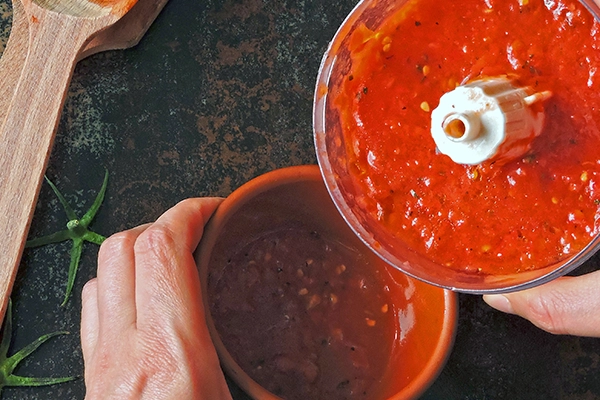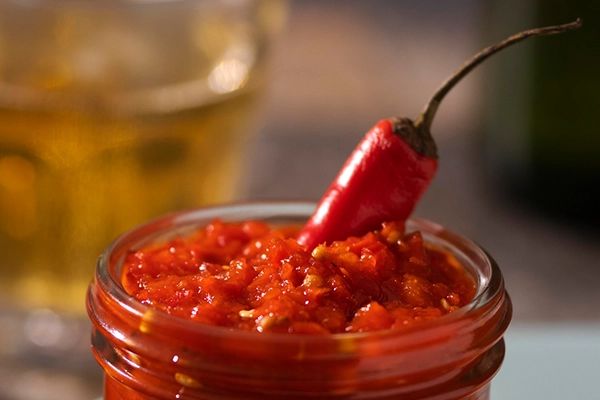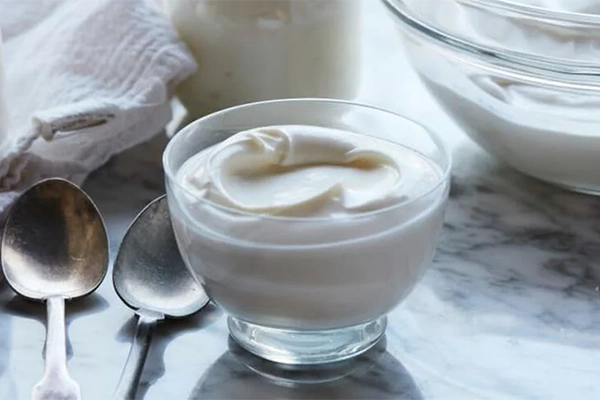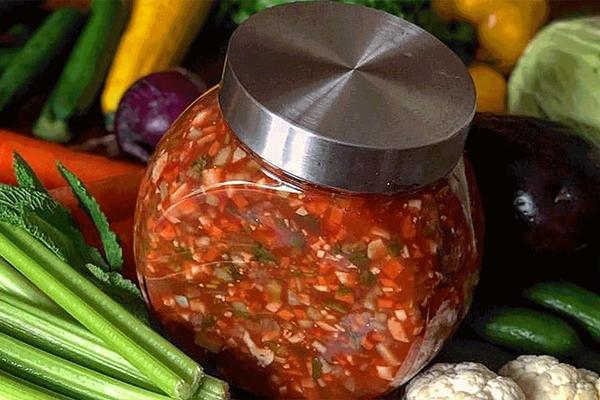Sauce is probably one of the most popular condiments in the world because it adds a special color and flavor to dishes, spicy and fiery. If you want to know how to make the best homemade hot sauce, you shouldn’t miss this article. You can make a great sauce with some simple ingredients and a few easy steps.

Ingredients for making homemade hot sauce
1. Fresh red peppers: 5 pcs (you can use hotter peppers like habanero or milder ones, depending on your tolerance).
2. White vinegar: 1/2 cup (to create flavor and increase shelf life).
3. Fresh garlic: 2 cloves (to increase aroma and flavor).
4. Honey or brown sugar: 1 tablespoon (to create a balance between spiciness and sweetness).
5. Salt: as needed.
6. Water: 1/4 cup.
How to make hot sauce
1. Prepare the peppers: Wash the peppers, and remove the tops. You can leave the seeds in for added heat, but if you prefer a milder flavor, remove the seeds.
2. Pre-cooking: Place the peppers and garlic in a small saucepan and simmer with a little water for 10 minutes until soft.
3. Blending the ingredients: After cooling, blend the peppers and garlic in a blender with vinegar, honey or brown sugar, and a pinch of salt. Blend all the ingredients until smooth. If too thick, add a little water.
4. Straining: To achieve a smooth sauce, the blended liquid should be passed through a strainer.
5. Final cooking: Pour the strained sauce into a saucepan and simmer over low heat for a few minutes. This not only helps to lock in the flavors, but also extends the shelf life of the sauce.
6. Storage: Pour the sauce into a sterilized jar and store in the refrigerator. This sauce will keep for several weeks.
Some golden tips to make hot sauce
– Extra fragrance can be given to the sauce with spices such as paprika, turmeric, or cumin powder.
– To vary the taste, white vinegar can be replaced by using apple cider vinegar or fresh lemon juice.
– If you like the smoky taste of the sauce, you can use chipotle peppers.
Homemade hot sauce has a different taste and lacks additives and preservatives. With this simple recipe, you can have an attractive and delicious seasoning for chicken, steak, pizza, and even salads at any time. So get started and experience the pleasure of cooking with homemade sauce!
Benefits of using hot sauce in foods
Sauce not only gives foods an exciting and delicious taste, but it also contains many benefits for the health of the body. This popular seasoning, through its natural ingredients, can play an effective role in improving health and increasing energy. Here are some of the most important benefits of consuming sauce.
1. Increases metabolism
One of the major constituents of sauce is capsaicin, contained in hot peppers. It is highly helpful in raising one’s metabolism and increasing the burning of calories by the body. Thus, to lose weight and get in shape, the consumption of sauce will help.
2. Boosts immunity
Sauce is rich in vitamin C and antioxidants; these help enhance the immunity of the individual and makes him/her strong against sickness or an infection.
3. Improvement of cardiovascular health
The regular use of sauce can lead to a reduction in bad cholesterol, LDL, and an increase in good ones, HDL. In addition, capsaicin in peppers promotes blood flow by reducing blood pressure and prevents the risk of heart disease.
4. Anti-inflammatory effects
Capsaicin found in hot sauce has anti-inflammatory properties that help diminish pain and inflammation in the body. This property will, therefore, be much useful for people suffering from diseases like arthritis or any muscle pain.
5. Improve digestive health
Sauce, consumed in moderation, serves to stimulate digestive enzymes and promotes digestion. The antibacterial properties of pepper further help in maintaining the digestive health of a person by slowing down the growth of injurious bacteria.
6. Stress reduction and elevation of mood
The consumption of sauce provokes the emission of endorphins and serotonin in the brain. These hormones reduce the amount of stress and anxiety and heighten the feelings of happiness and calmness.
7. Help regulate blood sugar
Studies have shown that the consumption of sauce helps regulate the level of sugar in the blood. This property is beneficial for persons with type 2 diabetes.
How to include hot sauce into your diet?
You can add hot sauce to chicken, fish, soup, salad, and even eggs to enjoy the hot sauce benefits. Make sure not to consume too much of it because this could cause stomach upsets; balance it.
Use of sauce is not only delicious but also very healthy; it speeds up your metabolism for great weight loss, improves heart health, and reduces stress. This delicious condiment can be added into your diet, and its taste can be experienced easily.
Side effects of using hot sauce in foods
Despite all the advantages of sauce, there are also side effects to it upon excessive consumption or when someone has specific conditions; hence, awareness will help prevent such issues that may bring harm to your health. Here are some of the major side effects of the use of sauce.
1. Irritation to the stomach and digestive disorders.
Excessive use of the sauce may lead to irritation of the stomach wall and create problems like heartburn or stomach ache for those who have a history of stomach ulcers or reflux.
2. Accentuated sensitivity in sensitive stomachs
Those who have sensitive stomachs or IBS might feel pain, bloating, or diarrhea after having sauce.
3. Skin and mucous membrane irritation
The capsaicin in sauce can be an irritant and burn if applied to the skin or eyes. It also causes irritation to the mucous membranes of the mouth, throat, and stomach if taken in excess.
4. Hemorrhoid risk
Excessive intake of spicy foods and hot sauces increases the risk of hemorrhoids in individuals prone to this condition due to the irritation of sensitive tissues in the lower digestive tract.
5. Taste and taste disorders
Over-consumption of the sauce too frequently and excessively may make you insensitive to the taste of milder flavors and habituate your taste buds to spicier foods, which might upset the balance of taste in your diet.
6. Aggravation of renal problems
Those suffering from kidney disease should be very aware of the amount of sauce consumption. Sodium in certain types of industrial sauces can increase the load on the kidneys and further damage kidney function.

How to avoid the side effects of hot sauce?
– Making homemade sauce using natural ingredients instead of buying industrial ones, full of preservatives and too much salt.
– Balance the intake of sauce, especially when you’re suffering from some digestive diseases or allergies, and go to the doctor.
– Reduce or stop taking it in case uncomfortable symptoms appear.
Sauce may have tasted very pleasant and has lots of benefits, but the sauce also can bring complications to the body due to excessive consumption or improper use. It only calls for moderation and observation of the body’s condition to enjoy the attractive taste without a care in the world.
Conclusion
But with its wide range of benefits, from increasing metabolism and helping with weight loss to strengthening the immune system and improving heart health, hot sauce will give food a different exciting flavor and can help keep the entire body healthy in its many ways. Moderate consumption of the condiment, therefore, can be included in the circle of good health. Although for some people, excessive use could be a problem, this could be enjoyed with a balance of enjoying its unique taste and innumerable benefits of the sauce. Now, add this condiment to your diet and start benefiting from it!










